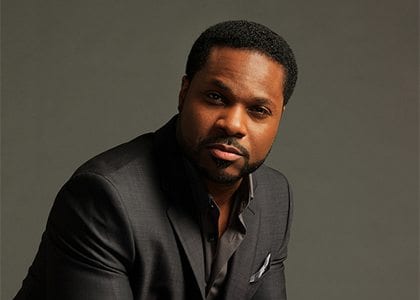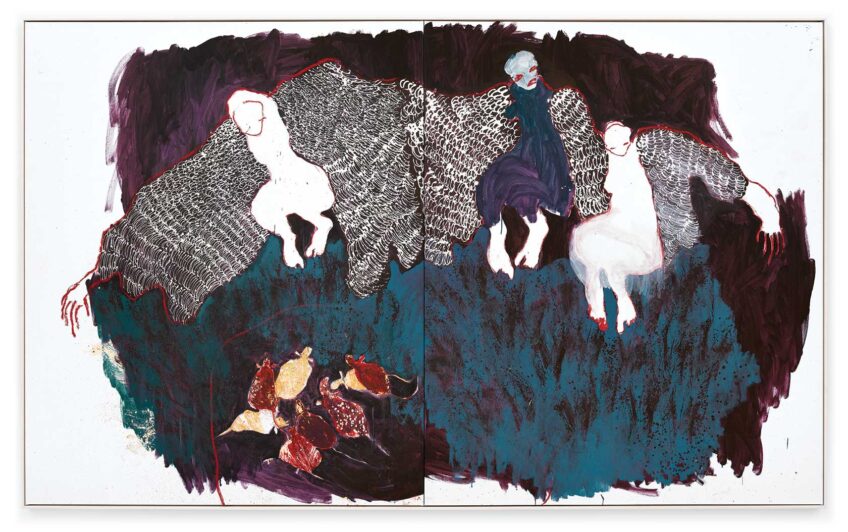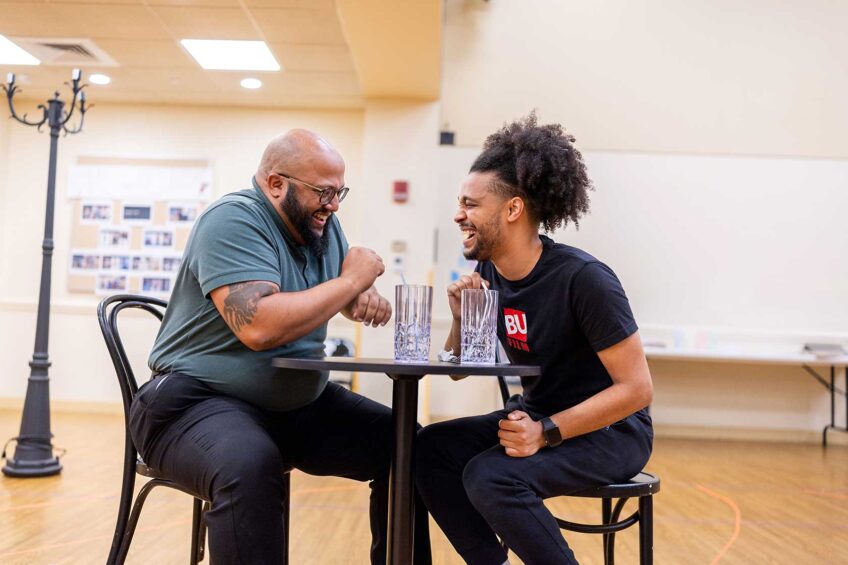Malcolm-Jamal Warner Reprises Sidney Poitier Role in the Huntington Theatre’s Guess Who’s Coming to Dinner


Malcolm-Jamal Warner in the Huntington Theatre’s Guess Who’s Coming to Dinner.
In the public eye since he was a teen, Malcolm-Jamal Warner is best known for his role as Theo Huxtable, the only son of Cliff and Clair Huxtable on NBC’s top-rated and popular 1980s sitcom, The Cosby Show. In 1986, he was nominated for an Emmy for his work on the show as Outstanding Supporting Actor in a Comedy Series. He shot the pilot for The Cosby Show when he was 13 but actually started out in community theater at the age of 9. His mother was always looking for things for him to do to keep him out of trouble. One year after basketball season had ended a friend of his mother’s suggested an acting workshop for young Malcolm. He auditioned for it, landed an agent, and as they say, the rest is history.
In the 20-plus years since The Cosby Show ended, the 44-year-old carved out a career for himself as an accomplished actor, director, and producer. In 1994, he made his film debut in the action film Drop Zone starring Wesley Snipes. From 1996 – 2000, Warner starred in the television show Malcolm & Eddie opposite comedian Eddie Griffin, and also composed the theme music for the sitcom. In 2011, Warner starred in, produced, and directed BET’s original series, Reed Between the Lines with Tracee Ellis Ross. He’s also appeared on NBC’s Community and The Michael J. Fox Show, as well as TNT’s HawthoRNe, Showtime’s Dexter, and Sci-Fi’s Jeremiah.
This modern-day Renaissance man is also a poet and a bass player, and fronts his own band, Miles Long.The jazz-funk band has performed in several major jazz festivals, including the Playboy Jazz Festival, and has opened for Earl Klugh and the late Luther Vandross.
This September, Warner makes his Huntington Theatre debut in Guess Who’s Coming to Dinner directed by David Esbjornson (All My Sons). Based on the 1967 Academy Award-winning film which starred Katharine Hepburn, Spencer Tracy, and Sidney Poitier, Warner stars as John Prentice, an African-American doctor who is brought home by his fiancée, Joanna, to meet her liberal, white parents. When John’s parents also arrive for dinner, both sets of parents must confront their own unexpected reactions and concerns for their children as their beliefs are put to the test.
Warner spoke to the Banner recently about working with his co-manager mom [Pamela Warner], his role in Guess Who’s Coming to Dinner, and growing up Cosby.
Your mom is your manager. Usually by this point, a lot of artists have transitioned from having their parent as their manager. How is it like working with her and is it still good for you?
Malcolm-Jamal Warner: Definitely. One of the reasons why people ultimately transition from having their parent as a manager to moving on because it gets to the point where it’s no longer good. Or, it gets to the point there’s only but so much the parent can do as a manager. My mother and I have worked so closely for so long. She’s such an integral part of my career. We definitely got to a point where we realized we needed more than what she could do just herself. We ended up getting another manager and they do a co-management situation. We jokingly refer to my mom as the ‘Chief of Staff.’ There are things that she does as a personal manager, that other managers wouldn’t necessarily do. She gets to focus on the day-to-day stuff. And, they get to focus on the career stuff. A lot of the business is still networking and who you know, and going to places. Neither my mom nor I have the mentality or disposition to be at functions and do all the stuff you need to do. We have a manager who is a player in the game and they can focus on that.

Malcolm-Jamal Warner at work in the Huntington Theatre’s Guess Who’s Coming to Dinner.
How is it following in the footsteps of Sidney Poitier?
MJW: You know it’s funny, I don’t think I’m following in his footsteps. Because, one, it would be too intimidating. Also, there’s a certain advantage we have in telling the story in 2014 than in 1967. I think Todd Kreidler, the writer, and David Esbjornson together did a really awesome job in allowing the story to take certain emotional turns that they just couldn’t do in 1967.
There’s a quote from Todd where he said, “he wanted to talk about and engage in the attitudes of 1967 with a 21st century approach.” How do you translate that as an actor?
MJW: I think it’s two things to answer your question. One, with the 21st century perspective, we have room to really deal with real emotional responses and emotional journeys that they just couldn’t do in ’67. When you see the movie, they tread so light that it’s almost lily-white compared to when you see the play, you see the tension. I think all the characters get to an emotional place. Take the Monsignor and Matt Drayton. Even their relationship is at stake that you don’t see in the movie. We can do that because we have a 21st century sensibility. So, there’s that.
Also, what Todd and David did is they were able to take this story, the topic of an interracial relationship, and it’s kind of universal. You can take the same story, and instead of an interracial relationship, you can take a gay couple. You can take the same story and it could be a Muslim bringing home a Christian. I don’t think you can necessarily get that in the movie. The work that they’ve done together, you get that the story transcends racial prejudices.
Even at the age of 13, you had the mindfulness of knowing that your experience was really important and different, and the knowledge to represent your mom and others in a certain way. It came naturally to you?
MJW: Even before Cosby, I always knew I was a reflection of my mother and father because they told me that. My mom said, ‘look until your 18, you are my responsibility.’ They kind of instilled that upon me at an early age. By the time I was on Cosby, it was just an extension of them. Early on, it was forced upon us to understand the social statement that the show was making without trying to make a social statement. So you had people saying that the show wasn’t realistic, black people don’t live like that, while at the same time getting tens of thousands of letters saying, ‘thank you because we are the Huxtables.’ My dad is a doctor and my mom is a lawyer. Thank you for representing us. At 14, when you’re getting that criticism and these letters, you’re kind of forced to understand, wow, that this is bigger than just being funny on TV.
I read an article years ago where Oprah Winfrey said one of the best pieces of advice she got from Mr. Cosby was to sign your own checks. Did he ever give you any advice that you still follow, or is part of who you are today?
MJW: Most of the things that I learned from him were things I learned from example. Traditionally, it took five days to shoot a sitcom. We finally got it down to four days. So, on Thursday night after we finished taping both of our shows, he would get on his plane and fly to either Vegas, Tahoe, Atlantic City, or somewhere, and he would do his stand-up Friday, Saturday and Sunday night and be back to work on Monday before any of us. So that kind of work ethic really hit me. He was doing this while he had the number one television show in the world. So, it kind of struck me that when you’re hot that’s when you bust your ass. So, when you’re not hot, you’re not making desperate career choices. And my mom had always impressed upon me if longevity is what you’re going for then you’re going to have dry spells. Look at anyone who has longevity. They go through dry spells. So, you want to make sure that you’re set up to have some kind of plan b. So, kind of my mother’s advice in conjunction with seeing Mr. Cosby’s work ethic has had a profound effect on what I do. In terms of something he’s actually voiced to me, I think probably one of the most important things is what he taught us about comedy in that to always go for the truth. Don’t go for the laugh. When you go for the laugh, you interrupt the truth.
How do you define success for yourself?
MJW: At the height of Cosby people would ask me, “what does success feel like, how does it feel to be successful?” I had never looked at The Cosby Show success as my success. It was the show’s success. It was Mr. Cosby’s success. I used to always say even back then as a teenager I can’t consider myself successful not until I’m 40-, 50-, 60-years-old and am still working consistently as an actor and a director. Only then can I look back and say I’ve had a successful career. For me, it was never about what’s happening now. It was about where am I going to be 15, 20 years from now? I can say at 44, that I have been successful in having a life after Cosby.
The Huntington Theatre presents Guess Who’s Coming to Dinner opening on Friday, September 5 and running through Sunday, October 5. Single tickets starting at $25 and FlexPasses are on sale. Tickets can be purchased online at www.huntingtontheatre.org; by phone at 617.266.0800; or in person at the BU Theatre Box Office located at 264 Huntington Avenue, and the Calderwood Pavilion at the BCA Box Office at 527 Tremont Street in Boston’s South End.






